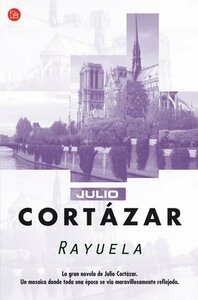Take a photo of a barcode or cover
¡Wow! Rayuela sí que es toda una experiencia. Lo leí con mi grupo de lectura y hubo opiniones de todo tipo, incluso quienes no pudieron continuarlo. Y entiendo perfectamente la razón.
Rayuela es un libro que amas u odias, que te atrapa o que te aleja. Y para prenderte a él tienes que esforzarte, sin embargo (en mi caso), llega un momento (que curiosamente coincide con el de otros compañeros) en el que notas que ya estás enganchado.
Mi opinión respecto al libro es igual de abstracta que su lectura. Sólo puedo decir que Cortázar ha hecho lo que ha querido, incluso hasta en los momentos en que causó aversión.
Definitivamente creo que es un libro que todos debemos leer, de un autor que representa a la Literatura muy dignamente... me dejó sorprendida.
Rayuela es un libro que amas u odias, que te atrapa o que te aleja. Y para prenderte a él tienes que esforzarte, sin embargo (en mi caso), llega un momento (que curiosamente coincide con el de otros compañeros) en el que notas que ya estás enganchado.
Mi opinión respecto al libro es igual de abstracta que su lectura. Sólo puedo decir que Cortázar ha hecho lo que ha querido, incluso hasta en los momentos en que causó aversión.
Definitivamente creo que es un libro que todos debemos leer, de un autor que representa a la Literatura muy dignamente... me dejó sorprendida.
adventurous
challenging
funny
mysterious
reflective
slow-paced
Flaws of characters a main focus:
Yes
Sometimes when you are confronted with The Greats of Literature, you treat their work like this precious, serious endeavor that you must intellectually conquer. When I first read this book, that's how I suffered through it. Now, years later, I decided to engage with it the way Cortazar invites us to: play the game.
It's in the title! Hopscotch is, first of all, a game. And it was a really fun one. The back and forth between chapters determines how the plot can show up next to reflections about art and then a joke and then back to characters taking themselves so seriously while the narration mocks them implicitly... The characters themselves are playing games with language and words and the book is playing along, inviting you, implicitly, to join in. Cortazar is constantly trying out structures and tones and styles, on occasion challenging the reader directly with a puzzle, and then going back to straightforward narration.
This is a book for people that like reading not as a way to "consume" plot, but for the pleasure of reading itself. It's not a book you can hurry along, but it's also not a book that will punish you for putting it aside for a bit. You can go at your own pace, enjoying each part, having fun with it. Step away and read something more conventional for a bit and then go back. Hell, go back and read it in a different order, see what happens. The only thing that this book asks you to do is play along.
You can, of course, just read it chronologically and get through it as fast as possible, leaving all the "extras" unread. You'll get a fine story that way, but you'll miss out on what makes this book special.
It's in the title! Hopscotch is, first of all, a game. And it was a really fun one. The back and forth between chapters determines how the plot can show up next to reflections about art and then a joke and then back to characters taking themselves so seriously while the narration mocks them implicitly... The characters themselves are playing games with language and words and the book is playing along, inviting you, implicitly, to join in. Cortazar is constantly trying out structures and tones and styles, on occasion challenging the reader directly with a puzzle, and then going back to straightforward narration.
This is a book for people that like reading not as a way to "consume" plot, but for the pleasure of reading itself. It's not a book you can hurry along, but it's also not a book that will punish you for putting it aside for a bit. You can go at your own pace, enjoying each part, having fun with it. Step away and read something more conventional for a bit and then go back. Hell, go back and read it in a different order, see what happens. The only thing that this book asks you to do is play along.
You can, of course, just read it chronologically and get through it as fast as possible, leaving all the "extras" unread. You'll get a fine story that way, but you'll miss out on what makes this book special.
Επιτέλους ολοκλήρωσα αυτο το βιβλίο και πόσο χαίρομαι! Σίγουρα ηταν μια αναγνωστική εμπειρία που δεν θα ξεχάσω. Υπήρχαν σημεία που λάτρεψα, σημεία που δεν κατάλαβα καθόλου σε σημείο να καίω εγκεφαλικά κύτταρα και φυσικά χαρακτήρες που μίσησα..
Ολιβέιρα εισαι ένα άτομο που δεν κατάλαβα αλλά ούτε θέλω να καταλάβω..
Ολιβέιρα εισαι ένα άτομο που δεν κατάλαβα αλλά ούτε θέλω να καταλάβω..
challenging
emotional
reflective
slow-paced
Plot or Character Driven:
Character
Strong character development:
Complicated
Loveable characters:
Yes
Diverse cast of characters:
Yes
Flaws of characters a main focus:
Yes
emotional
informative
mysterious
reflective
medium-paced
Plot or Character Driven:
A mix
Strong character development:
Complicated
Loveable characters:
Complicated
Diverse cast of characters:
No
Flaws of characters a main focus:
Yes
Rayuela is a hard book to start with if you want to get to know Cortázar. Loved it, but so tricky it's hard for you to get when he's talking about himself and when he's talking about others. Surrounded by a bohemian atmosphere, Cortazar tells a nostalgic and bittersweet story with incredibles metaphors and writing-games only he could've thought of. Glancing frequently at the past, Cortazar makes you fall in love with Paris and with Buenos Aires, even though he can't stop complaining about every single thing of them. There's some breathable melancholy in the book that makes you suffer between the pages, but if you know Buenos Aires, you won't be able to stop reading.
Es un libro muy complejo sin lugar a dudas, la primera parte me encantó, me hizo reflexionar, investigar. La disfruté mucho. La segunda a pesar de que parece más lineal, me desencanto. Tiene capítulos que a mi gusto son una joya, el 7 es mi perdición, con el 23 me reí mucho, el 28 es una oda al absurdo, el 29 me hizo llorar. El 41 me desesperó y el 56 yo quería aventar a Oliveira por la ventana. Creo que con este libro me sentí como la Maga, necesitaba una constante explicación de las cosas. Seguro lo volveré a leer en algunos años y buscaré después mis notas para compararlas.
One of the first "high lit" books I ever read, during my senior year of high school between Harry Potter and Abarat. It was well above my head then, couched in references I had no chance of understanding at the time, but I marvelled at every page, flipping through some difficult passages, reading others more than twice. Perhaps because of the difficult I had with reading it, it became a sort of magical object. I could not read it like a normal book, physically or intellectually, but I could not stop reading it. There are lines in Chapter 23 which, reading through a second time more recently, I could still recall word for word. (This is 5 years later.) If anything, there is magic in that.
Some of the magic must be attributed to how the book is read: the reader can choose to read the book in order or to skip around chapters in an path lightly prescribed by the author (which, given that half the book remains unread if this path is foregone, most choose the hopscotching path). This adds an additional difficulty to the book. The reader must search through the novel to find each new chapter. And the novel itself is about searching, constant and numerous searches. Thus the reader consciously, physically enacts the novel by reading it. It creates a bond between the reader and the read which feels entirely magical.
"Everything depends on … (a sentence scratched out)." -- Julio Cortazar, Hopscotch
Some of the magic must be attributed to how the book is read: the reader can choose to read the book in order or to skip around chapters in an path lightly prescribed by the author (which, given that half the book remains unread if this path is foregone, most choose the hopscotching path). This adds an additional difficulty to the book. The reader must search through the novel to find each new chapter. And the novel itself is about searching, constant and numerous searches. Thus the reader consciously, physically enacts the novel by reading it. It creates a bond between the reader and the read which feels entirely magical.
"Everything depends on … (a sentence scratched out)." -- Julio Cortazar, Hopscotch



